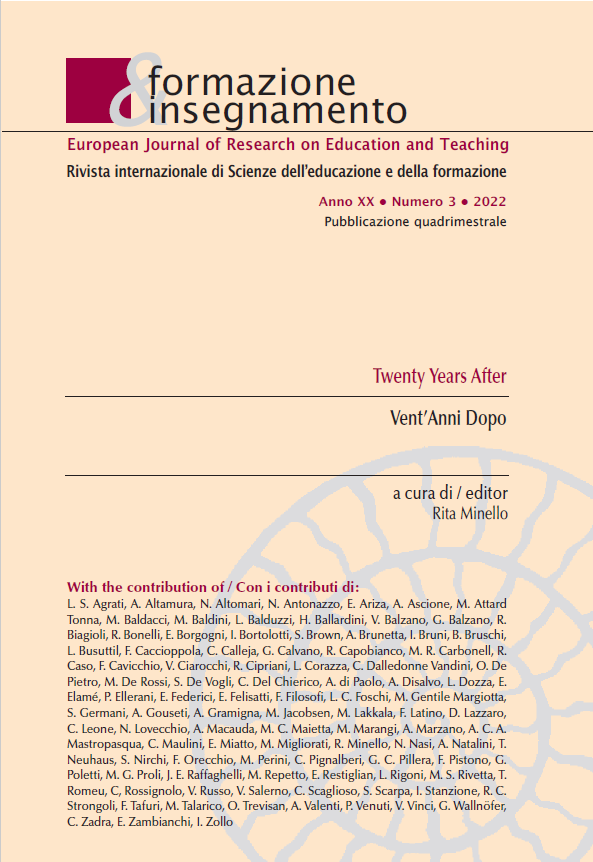Toward an ecosystem approach to promote new school-land alliances: A critical reading of some pedagogical imperatives (sustainability, agency, formativity) to cultivate habitability
DOI:
https://doi.org/10.7346/-fei-XX-03-22_05Keywords:
Agency, Formativity, Adult Education, Pedagogy of Living, Sustainable developmentAbstract
Never before as in recent years has the study of pedagogy been oriented toward the analysis, exploration and definition of tools and methodologies capable of building alliances between “possible” intercamps (family, school, Third Sector), people who inhabit intercamps, knowledge, and different cultures, in the direction of defining an expanded educational ecosystem as a substantive part of educating communities. The paper aims to provide the reader with some critical insights through the analysis of some “formative imperatives” that constitute the focus of a new pedagogical approach, namely that of habitability: (1) the importance of civic engagement (Golubeva, 2018; White and Mistry, 2019); (2) education for sustainable development (UN, 2015); and (3) the capability approach (Nussbaum, 2012; Sen, 2001).
References
Alessandrini, G. (2019). Sostenibilità e Capability Approach. Milano: FrancoAngeli.
Bertagna, G. (2020). La scuola al tempo del Covid. Tra spazio di esperienza ed orizzonte d’attesa. Roma: Studium.
Cantone, R., & Caringella, F. (2017). La corruzione spuzza. Tutti gli effetti sulla nostra vita quotidiana della malattia che rischia di uccidere l’Italia. Milano: Mondadori.
Casey, E. (1996). How to get from space to place in fairly short stretch of time. In S. Feld & K. Baso (Eds.), Sense of Place (pp. 14–-51). Santa Fe: School of American Research. Retrieved September 30, 2022, from https://escasey.com/Article/How_to_Get_from_Space_to_Place_in_a_Fair.pdf
Ceruti, M., & Bellusci, F. (2020). Abitare la complessità. La sfida di un destino comune. Sesto San Giovanni (MI): Mimesis.
Corsi, M. (2018). Come pensare l’educazione. Brescia: La Scuola.
De Bartolomeis, F. (2018). Fare scuola fuori della scuola. Roma: Aracne.
Del Gottardo, E. (2017). Comunità educante, apprendimento esperienziale, comunità competente. Napoli: Giapeto.
Dewey, J. (1949). Scuola e società. Firenze: La Nuova Italia.
Dozza, L. (2019). Maestra Natura. Per una pedagogia esperienziale e co-partecipata. Bergamo: Zeroseiup.
Dozza, L., & Danese, G. (2013). Una società a misura di apprendimento. Educazione permanente tra teoria e pratiche. Milano: FrancoAngeli.
Ellerani, P. G. (2020). Capability ecosystem: l’ecosistema per l’innovazione e la formazione. Dal co-working al contesto di capacitazione. Roma: Armando.
Ferrière, A. (1953). L’autonomia degli scolari. Firenze: La Nuova Italia.
Frabboni, F. (2017). La mia pedagogia. Lungo le valli incantata dell’educazione. Pisa: ETS.
Frey, C. B., Chen, C., & Presidente, G. (2020). Democracy, Culture and Contagion: Political Regimes and Countries responsiveness to Covid-19. Covid economics: vetted and realtime papers, 18(1), 222–238.
Gherardi, V. (2019). Spazi ed Educazione. Roma: Aracne.
Giaccardi, C., & Magatti, M. (2020). Nella fine è l’inizio. In che mondo vivremo. Bologna: il Mulino.
Giroux, H. (2021). Pandemic Pedagogy. Education in time of crisis. New York: Bloomsbury.
Golubeva, I. (2018). The links between education and active citizenship/civic engagement. NESET II ad hoc question, 2018(1), 1–24. Retrieved September 30, 2022, from https://nesetweb.eu/wp-content/uploads/2019/06/NESET2_AHQ1.pdf
Gristy, C., Hargreaves, L., & Kučerová, S.R. (Eds.) (2020). Educational research and schooling in rural Europe. An engagement with changing patterns of education, space, and place. Charlotte (NC): Information Age Publishing.
Joint Research Centre, Institute for Prospective Technological Studies, Law, N., Miyake, N., Kampylis, P., et al. (2013). ICT-enabled innovation for learning in Europe and Asia: exploring conditions for sustainability, scalability and impact at system level. Luxembourg: Publications Office of the European Union. https://data.europa.eu/doi/10.2791/25303
Malavasi, P. (2020). Insegnare l’umano. Milano: Vita e Pensiero.
Manca, A., Benczur, P., & Giovannini, E. (2017). Building a Scientific Narrative Towards a More Resilient. EU Society Part 1: a Conceptual Framework. Luxembourg: Publications Office of the European Union.
Mannese, E. (2020). Racconti dallo spazio. Per una pedagogia dei luoghi. Lecce-Brescia: Pensa Multimedia.
Margiotta, U. (2015). Teorie della formazione. Nuovi orizzonti della pedagogia. Roma: Carocci.
Morin, E. (2020). Cambiamo strada. Milano: Raffaello Cortina.
Mortari, L. (2019). Aver cura di sé. Milano: Raffaello Cortina.
Murray, R., Caulier-Grice, J., & Mulga, G. (2010). The Open book of social innovation. UK: NESTA and The Young Foundation. Retrieved September 30, 2022, from https://www.youngfoundation.org/our-work/publications/the-open-book-of-social-innovation/
Nussbaum, M.C. (2002). Giustizia sociale e dignità umana. Da individui a persone. Bologna: il Mulino.
Nussbaum, M.C. (2012). Creare capacità. Liberarsi dalla dittatura del Pil. Bologna: il Mulino.
ONU (2015). Risoluzione adottata dall’Assemblea Generale, 25 settembre 2015: Trasformare il nostro mondo: l’Agenda 2030 per lo Sviluppo Sostenibile [A/RES/70/1]. Retrieved September 30, 2022, from https://unric.org/it/wp-content/uploads/sites/3/2019/11/Agenda-2030-Onu-italia.pdf
Pareyson, L. (1974). Estetica. Teoria della formatività. Firenze: Sansoni.
Pignalberi, C. (2022). Per una pedagogia dell’abitare: nuovi modelli generativi di apprendimento nei contesti informali e non formali per la coltivazione delle character skills. Pedagogia e Vita, 1, 95–103.
Platone (399-388 a.C.). Apologia di Socrate.
Postman, N. (1997). La fine dell’educazione. Roma: Armando.
Ren, S., Rabenstein, K., & Fritzsche, B. (2011). Learning spaces without boundaries? Territories, power and how schools regulate learning. Social & Cultural Geography, 12(3), 58–75. https://doi.org/10.1080/14649365.2011.542482
Ricoeur, P. (1997). La persona. Brescia: Morcelliana.
Sen, A. (2001). Lo sviluppo è libertà. Perché non c’è crescita senza democrazia. Milano: Mondadori.
Sennett, R. (2018). Costruire e abitare. Etica per la città. Milano: Feltrinelli.
Tuan, Y. (1977). Space and place: the perspective of experience. Minneapolis: University of Minnesota Press. Retrieved September 30, 2022, from https://www.academia.edu/19846369/Yi_Fu_Tuan_Space_and_Place
UNESCO (2021). Reimagining a new social our futures together: a new social contract for education. Report from the International Commission on the Futures of Education. Paris: UNESCO.
Vaccarelli, A. (2016). Le prove della vita. Promuovere la resilienza nella relazione educativa. Milano: FrancoAngeli.
Vanderbeck, R. M., & Worth, N. (2015). Intergenerational space. London: Routledge.
Wenger, E. (1998). Communities of practices. Learning, meanings and identities. Cambridge: Cambridge University Press.
White, E.S., & Mistry, R.S. (2019). Teachers’ civic socialization practices and children’s civic engagement. Applied Developmental Science, 23(2), 183–202. https://doi.org/10.1080/10888691.2017.1377078
Downloads
Published
How to Cite
Issue
Section
License
Copyright (c) 2022 Claudio Pignalberi

This work is licensed under a Creative Commons Attribution 4.0 International License.
Formazione & insegnamento is distributed under Attribution 4.0 International (CC BY 4.0).
For further details, please refer to our Repository & Archiving Policy, as well as our Copyright & Licensing Terms.





